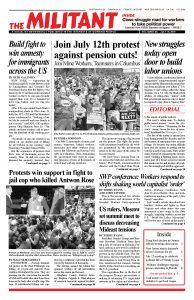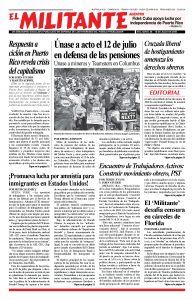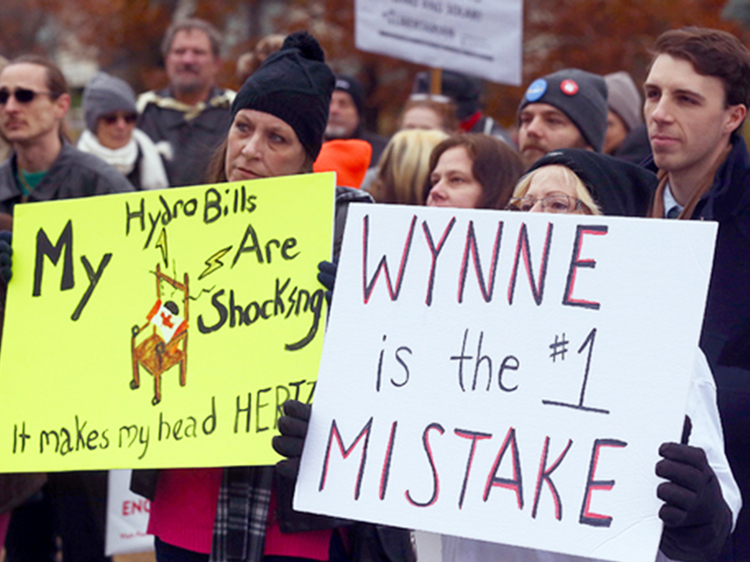MONTREAL — On June 29 political outsider, “anti-establishment politician” and millionaire businessman Doug Ford took office as the premier of Ontario, Canada’s most populous province and industrial heartland. His Progressive Conservative Party won the June 7 election there.
The Liberal party, which had governed the province for 15 years, suffered a historic and humiliating defeat. The social democratic New Democratic Party, backed by the trade union officialdom, also made gains at the expense of the Liberals, coming in second and is now the official opposition in the Ontario legislature.
Ford’s election, and the sizable vote against the Liberals, reflects the unease and anger of millions of working people who have for years faced the debilitating effects of the ongoing crisis of capitalist production, jobs and trade in Canada and worldwide. Stagnant wages, the disappearance of stable good-paying industrial jobs, and the bosses’ unrelenting productivity and profit drive that has led to deteriorating and unsafe working conditions have been the result. At the same time, workers have been hit with increased prices for necessities like gasoline and electricity.
Ford’s sudden rise and his election was opposed by most of the bourgeois press. The editors of the conservative Toronto Globe and Mail declared him “unfit for the job” because he is not part of the traditional political establishment. His victory follows recent, similar developments like the election of Donald Trump as U.S. president, the Brexit vote in the United Kingdom and recent election results in Italy.
Ford’s victory is a harbinger of turbulence and instability in the Canadian rulers’ traditional political parties as the country moves toward a federal election in 2019.
Where did Ford come from?
Ford’s only previous political experience was a four-year term as a Toronto city councillor from 2010 to 2014. His brother Rob Ford — also viewed by the rulers as a political outsider — was then mayor of Toronto, elected on a promise to “end the gravy train” of perks, privileges and high salaries for political hacks and government bureaucrats, as well as to cut taxes.
Like his brother, Rob Ford said he would be the defender of the “little guy” against the downtown Toronto “liberal elites.” Workers who voted for the Ford brothers — residents of the suburban working-class and heavily immigrant Toronto neighborhoods — call themselves “Ford Nation.” But scandals, centered on Rob Ford’s substance abuse, plagued his four-year tenure as mayor. His candidacy for a second term was cut short when he became sick and subsequently died of cancer. Doug Ford ran for mayor in his place but was defeated.
Doug Ford became the Progressive Conservative leader on the eve of the election at a special party convention called after the previous party leader was forced to resign under accusations of sexual improprieties.
Doug Ford’s campaign centered on reducing government interference in people’s lives; lowering the cost of living through cuts in electricity rates, which dramatically increased under the Liberals; as well as cuts in provincial income taxes and gasoline taxes. He campaigned for an end to “identity politics” sex education classes in schools and the myriad of other government moves to interfere and regulate the lives of working people imposed by the Liberals.
He promised to create jobs by ending Liberal “green” policies, like the carbon taxes, that Ford labeled anti-business. Ford said he would eliminate provincial income taxes for those making minimum wage, while also rolling back Liberal government-backed legislation that would raise the minimum wage to $15.
Workers’ lives devastated
In the election, the Progressive Conservative Party got its votes in small towns, rural areas and in working-class suburban Toronto. The NDP came in second, with just over half as many seats, with its votes from industrial towns and cities and the mining regions of the province.
With a population of 14 million, Ontario has over one-third of Canada’s population. It is the center of steel, auto, machinery production, chemicals as well as hard rock mining, such as nickel and other minerals. Seventy-six percent of Canada’s exports go to the U.S. and 52 percent of these come from Ontario. One million unionized workers are members of the Ontario Federation of Labour, about one-fifth of all unionized workers in Canada.
The unending, grinding worldwide capitalist slowdown in production and trade has devastated the lives of hundreds of thousands of workers across Ontario’s “rust belt.” In the decade up to 2014 over 365,000 well-paid union jobs had been wiped out. In industrial cities like Hamilton, opioid overdoses among workers are rising dramatically.
The Globe and Mail predicted Ford would win the election, saying there was an “eerie resemblance” in parts of Ontario to the hard-hit working-class regions in the U.S. that “helped propel Donald Trump to the presidency.”
The article said three-quarters of those in a recent poll said they “believe the economy is rigged to benefit the rich and powerful,” with a majority seeking a leader “who is willing to break the rules.”


